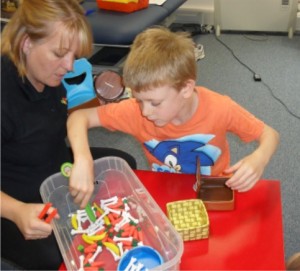Why Occupational Therapists Are So Important For Children With Additional Needs?


As a child develops, parents and health-care workers look for signs that show certain milestones are being reached. These include in a generic sense the “occupations” of learning, playing, feeding and dressing themselves, and self- help.
The instincts of the parents are usually the first indicator that something may not be quite right. For example, where a child demonstrates difficulties with movement or basic tasks, there are concerns.
Following assessments by health-care professionals, an occupational therapist for children may be appointed to suggest a plan of action to help a child achieve their full potential. They will be able to step in where it is clear that a child’s sense of independence is impaired, or where for whatever reason their strength or skills are hampered.
There are five key developments that define a child’s progress. These include the ability to help themselves, to successfully solve visual perception problems, to demonstrate cognition, to process sensory challenges and, finally, fine and gross motor skills.
Nothing will be achieved without careful and thorough diagnosis. So the occupational therapist will have the necessary professional skills to assess the individual needs of the child and only then recommend a suitable programme of learning.
For instance, an occupational therapist will collate data gathered from parents, health-care workers, schools and other professionals to carry out a thorough assessment and determine a child’s current achievements and future needs.
The therapist will be able to suggest suitable equipment to enable the child to reach the targeted outcomes in development. Or in some cases it may be necessary to adapt the home environment to maximise the child’s potential.
The best outcomes are achieved by looking carefully at how the child plays, what level of motor skills they possess, their ability to perceive and solve sensory or visual problems, how they understand the world, what level of independence they display, their ability to multi-task, their balance, eating and drinking skills and their behaviour management techniques and signposting abilities.
Of course, success depends upon effective communication with the family about the plan and their willingness to commit to any programme.
The occupational therapist will also be able to guide the family and suggest ways in which they can access other services which may be of benefit to the child’s development.
An effective occupational therapist for children will work in collaboration with other professionals such as physiotherapists, speech and language therapists and external disciplines. This multi-disciplinary approach should ensure the best outcome for the child with additional needs.
